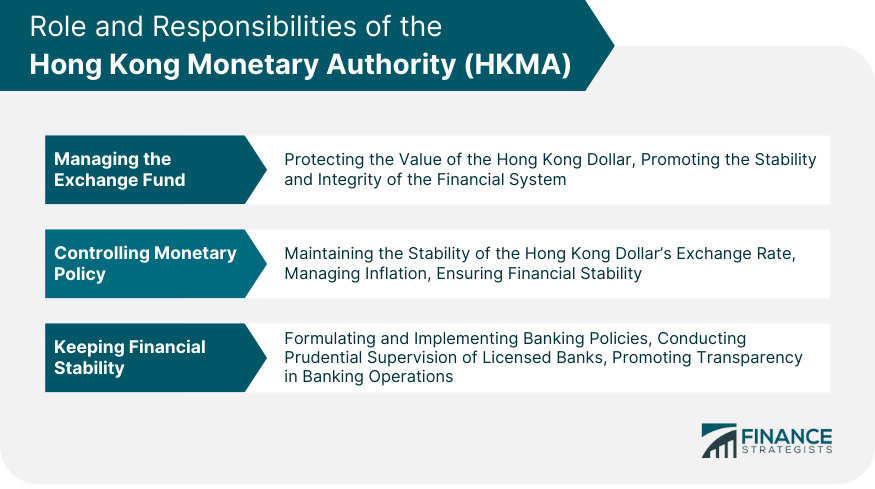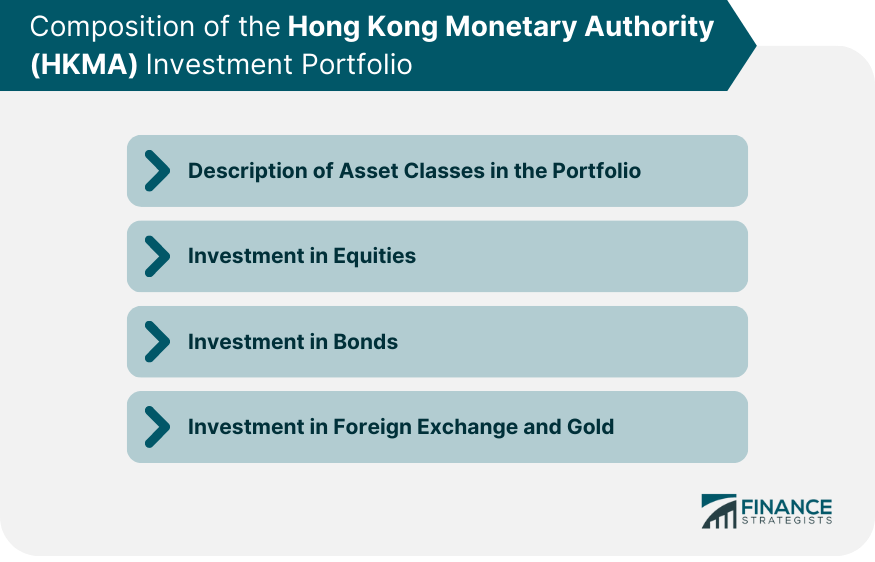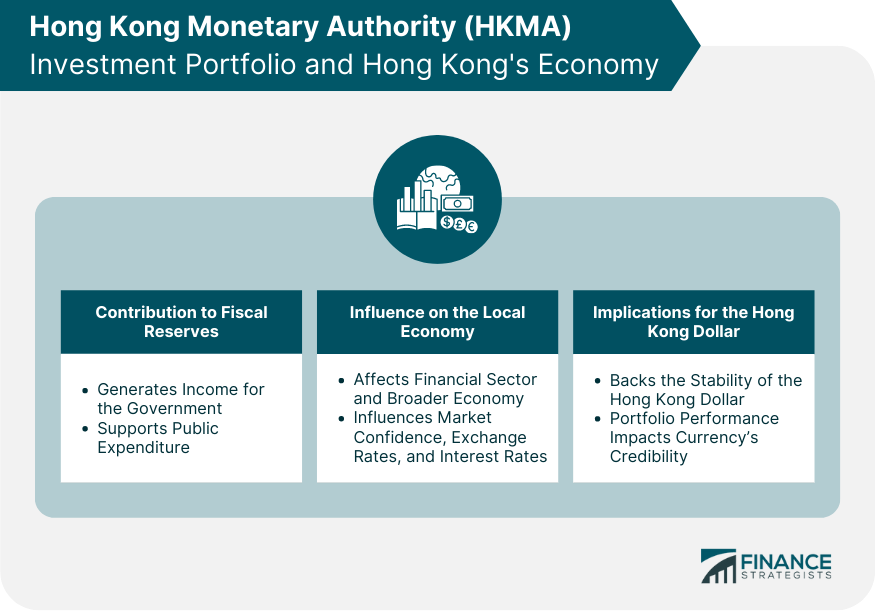The Hong Kong Monetary Authority (HKMA) is the government authority responsible for maintaining monetary and banking stability in Hong Kong. Established in 1993, HKMA acts as the central bank of Hong Kong and operates under the guidance of the Financial Secretary. Its primary objectives include maintaining the stability of the Hong Kong dollar, safeguarding the banking system's integrity, and promoting the overall stability and development of the financial sector. HKMA's key functions include issuing currency, managing the Exchange Fund, regulating banks and financial institutions, and promoting Hong Kong as an international financial center. Through its proactive approach, HKMA plays a vital role in ensuring the soundness and resilience of Hong Kong's financial system. The HKMA Investment Portfolio is a significant component of the Hong Kong Monetary Authority's activities. The portfolio primarily consists of investments made with the Exchange Fund, which is managed by the HKMA. The investments are diversified across different asset classes, including equities, fixed-income securities, and alternative investments. The HKMA aims to achieve a balance between generating investment returns and maintaining the stability and liquidity of the portfolio. The investment decisions are guided by prudent risk management principles and the long-term objectives of preserving the value of the Exchange Fund for the benefit of Hong Kong's financial stability and future generations. One of the HKMA's primary responsibilities is managing the Exchange Fund. It aims to protect the value of the Hong Kong dollar and promote the stability and integrity of the financial system. The fund's assets primarily derive from fiscal reserves, placements by fiscal authorities, and proceeds from the issuance of certificates of indebtedness and coins. The HKMA is tasked with maintaining the stability of the Hong Kong dollar's exchange rate. Through the Linked Exchange Rate system, the HKMA ensures the currency trades within a narrow band against the US dollar. The authority also adjusts monetary policy in response to economic conditions, aiming to manage inflation and maintain financial stability. In addition to its monetary role, the HKMA oversees the health and stability of the banking sector. It formulates and implements banking policies, conducts prudential supervision of licensed banks, and promotes transparency in banking operations. The HKMA Investment Portfolio comprises various asset classes, including equities, bonds, foreign exchange, and gold. The diversity of the portfolio helps minimize risk and optimize returns, aligning with the long-term objectives of the Exchange Fund. The equity component of the portfolio consists of shares in companies across different sectors and geographical regions. The HKMA invests in both developed and emerging markets, seeking to capitalize on the growth potential of these markets while also hedging against economic downturns. Bonds, particularly government and corporate bonds from stable economies, form a substantial part of the portfolio. These investments provide regular income through interest payments and contribute to the overall stability of the portfolio. The portfolio includes substantial foreign exchange reserves, primarily in US dollars, euros, and yen. These reserves serve as a hedge against currency risk. Gold, a traditional safe-haven asset, also forms part of the portfolio, providing a buffer against financial crises and inflation. The HKMA's investment strategy aims to maintain the stability and integrity of the financial system while maximizing returns within acceptable risk parameters. The authority employs a mix of active and passive management strategies, using in-house and external fund managers. Risk management is a key aspect of the HKMA's portfolio management. The authority implements rigorous risk assessment and control mechanisms, including regular stress testing, sensitivity analysis, and scenario planning, to manage various risks such as market, credit, liquidity, and operational risks. The HKMA maintains a diversified investment portfolio to spread risk across different asset classes and geographical regions. This approach helps mitigate the impact of downturns in any particular asset class or market on the overall portfolio. Historically, the HKMA Investment Portfolio has delivered steady returns, contributing significantly to the Exchange Fund's income. The portfolio's performance reflects the strength of global financial markets and the effectiveness of the HKMA's investment strategies. The HKMA's portfolio performance is often compared against predefined benchmarks for each asset class. Generally, the portfolio has performed in line with or exceeded these benchmarks, demonstrating the success of its diversified investment approach and risk management strategies. The performance of the HKMA Investment Portfolio is heavily influenced by global financial trends. For instance, during periods of financial turmoil, such as the 2008 global financial crisis or the COVID-19 pandemic, the portfolio demonstrated resilience and managed to protect the value of Hong Kong's fiscal reserves. The HKMA Investment Portfolio plays a vital role in contributing to Hong Kong's fiscal reserves. The returns generated from the portfolio provide a significant source of income for the government, supporting public expenditure and contributing to fiscal stability. The management and performance of the HKMA Investment Portfolio directly impact Hong Kong's financial sector and the broader economy. Investment decisions and portfolio performance can affect market confidence, exchange rates, and interest rates, influencing economic growth and stability. The HKMA uses the Exchange Fund, which includes the investment portfolio, to back the Hong Kong dollar. Therefore, the portfolio's performance can impact the stability and credibility of the currency in the foreign exchange markets. Market volatility is a significant challenge for the HKMA Investment Portfolio. Changes in global financial markets, economic conditions, and interest rates can impact the portfolio's performance. The HKMA uses robust risk management strategies to navigate such volatility. Geopolitical events, such as international conflicts or political changes, pose risks to the portfolio. For instance, tensions between major economies can disrupt global trade and financial markets, potentially affecting the portfolio's assets. Emerging markets present growth opportunities for the HKMA Investment Portfolio. These markets, while potentially riskier, offer higher potential returns. The HKMA carefully balances these opportunities with the associated risks. The Hong Kong Monetary Authority (HKMA) plays a crucial role in maintaining monetary and banking stability in Hong Kong. Its investment portfolio managed through the Exchange Fund, contributes to fiscal reserves and supports public expenditure. The portfolio's performance influences market confidence, exchange rates, and interest rates, thereby impacting the broader economy. The stability and credibility of the Hong Kong dollar are also tied to the portfolio's performance. However, the portfolio faces challenges from market volatility and geopolitical risks. Nevertheless, it also presents opportunities, particularly in emerging markets. Through prudent risk management, diversification, and successful performance, the HKMA Investment Portfolio has historically delivered steady returns and contributed to the financial stability and resilience of Hong Kong's economy.Definition of the Hong Kong Monetary Authority (HKMA)
HKMA Investment Portfolio
Role and Responsibilities of the HKMA

Managing the Exchange Fund
Controlling Monetary Policy
Keeping Financial Stability
Composition of the HKMA Investment Portfolio

Description of Asset Classes in the Portfolio
Investment in Equities
Investment in Bonds
Investment in Foreign Exchange and Gold
Management of the HKMA Investment Portfolio
Investment Strategy
Risk Management
Portfolio Diversification
Performance of the HKMA Investment Portfolio
Historical Performance
Comparison With Benchmarks
Impact of Global Financial Development
HKMA Investment Portfolio and Hong Kong's Economy

Contribution to Fiscal Reserves
Influence on the Local Economy
Implications for the Hong Kong Dollar
Challenges and Opportunities for the HKMA Investment Portfolio
Market Volatility
Geopolitical Risks
Opportunities in Emerging Markets
Bottom Line
Hong Kong Monetary Authority (HKMA) FAQs
The Hong Kong Monetary Authority Investment Portfolio (HKMA) comprises the assets of the Exchange Fund, which is used to support the Hong Kong dollar and manage the territory's monetary policy. The portfolio is diversified and includes equities, bonds, foreign exchange, and gold.
The HKMA manages its investment portfolio with a strategy aiming to maintain financial stability while maximizing returns within acceptable risk parameters. This involves a mix of active and passive management strategies, rigorous risk management, and portfolio diversification across different asset classes and geographical regions.
The performance of the HKMA Investment Portfolio is influenced by global financial trends, market volatility, and geopolitical events. Additionally, the portfolio's performance is heavily contingent on the HKMA's investment strategies and risk management practices.
The HKMA Investment Portfolio plays a crucial role in Hong Kong's economy. It contributes to Hong Kong's fiscal reserves, influencing the financial sector and broader economy, and impacts the stability and credibility of the Hong Kong dollar in the foreign exchange markets.
The future of the HKMA Investment Portfolio will likely be shaped by evolving global financial markets, technological advancements, and the growing importance of sustainability and environmental, social, and governance (ESG) considerations in investment decisions.
True Tamplin is a published author, public speaker, CEO of UpDigital, and founder of Finance Strategists.
True is a Certified Educator in Personal Finance (CEPF®), author of The Handy Financial Ratios Guide, a member of the Society for Advancing Business Editing and Writing, contributes to his financial education site, Finance Strategists, and has spoken to various financial communities such as the CFA Institute, as well as university students like his Alma mater, Biola University, where he received a bachelor of science in business and data analytics.
To learn more about True, visit his personal website or view his author profiles on Amazon, Nasdaq and Forbes.











